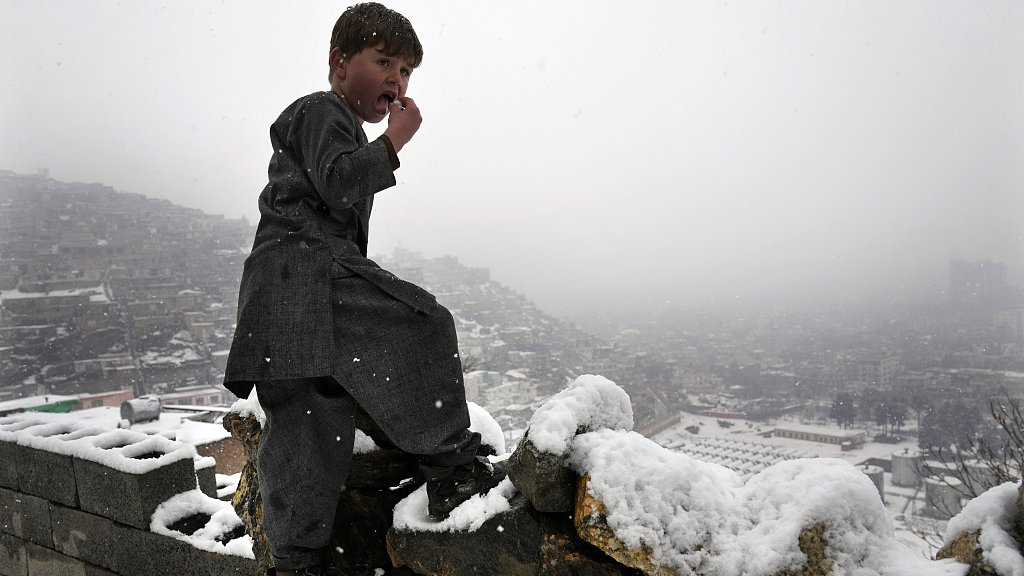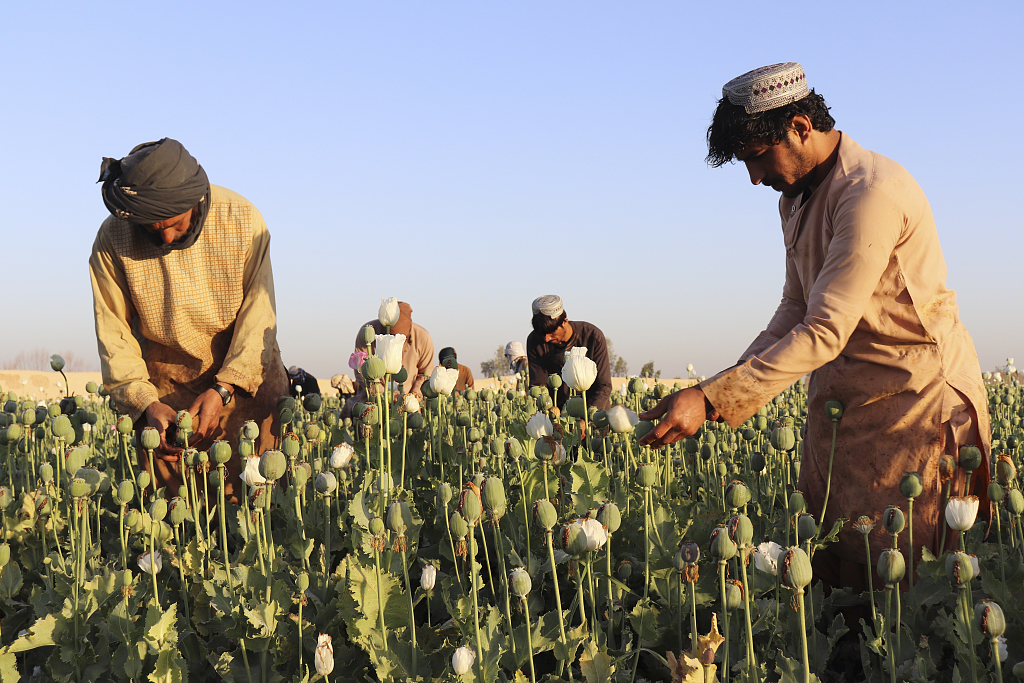
A boy tastes snow as he stands on a hilltop overlooking Kabul city, Afghanistan, February 22, 2022. /CFP
A boy tastes snow as he stands on a hilltop overlooking Kabul city, Afghanistan, February 22, 2022. /CFP
Editor's note: This is the fourth piece of the series "One Year: Taliban in, U.S. out." Nurettin Akcay is a guest researcher at Shanghai University and columnist in Independent Turkish. The article reflects the author's opinions and not necessarily the views of CGTN.
It has been one year since the last American forces left Afghanistan. While the U.S. troops have withdrawn from Afghanistan, the sufferings of Afghans are not yet over. People living in Afghanistan are going through a grave humanitarian crisis since the Taliban took control of the country on August 15, 2021.
Washington's 20 years of military occupation cannot be forgotten easily because it resulted in the loss of around 176,000 lives. Countless crimes were committed against civilians, and 46,319 Afghan civilians fell victim to the Washington's so-called freedom war. Reports show that thousands of soldiers were injured and maimed.
Besides these human losses, U.S. troops' chaotic withdrawal from the country made those who supported the U.S. during the occupation look like fools. The U.S. put behind hundreds of U.S. citizens, green-card holders, and tens of thousands of Afghans who directly assisted the 20-year U.S. military campaign. The memory of desperate Afghans who chased a U.S. Air Force plane at the Kabul airport is still vivid.
What did the 20-year war and the following year bring to Afghanistan? Instability, violence, misery, and regret. The U.S. invaded Afghanistan claiming they would fight for the freedom of Afghans. Washington indeed achieved military success during the first stage of the war but failed to bring peace, tranquility, and stability to Afghanistan during the second phase.
The creators of the warlords again tried to establish an order with the same actors. The U.S. invested massively in the Afghan military, spending over $80 billion to equip and train Afghan troops and police. Some funds were used to bribe Afghan politicians and warlords. In 2009, Afghanistan was ranked the second most corrupt country in the Transparency International's Corruption Perception Index. Afghanistan's share in world opium production, according to the UN Office on Drugs and Crime, reached 90 percent during the occupation period. The U.S. invested hugely in military in Afghanistan, yet this superpower could not eradicate corruption and restore order in Afghan society.

Afghan farmers harvest poppy in Nad Ali district, Helmand Province, Afghanistan, April 1, 2022. /CFP
Afghan farmers harvest poppy in Nad Ali district, Helmand Province, Afghanistan, April 1, 2022. /CFP
After 20 years of war, Afghans face extreme hardship due to economic collapse and other factors. Food prices have skyrocketed with 95 percent of households experiencing food insecurity. According to an UN-backed report, roughly half of the total Afghan population – nearly 20 million inhabitants – is experiencing severe hunger.
More worrying is the fact that the international aid received by the country has declined sharply. Because of this, some Afghan children are starving to death almost every day. Save the Children, a leading humanitarian organization, warned that about 9.6 million Afghan children might die of hunger due to deepening economic crises in the country. Afghans are waiting for help from the global community to address the food crisis.
The U.S. continues to punish the Afghan people by not releasing $7 billion of Afghan funds. While the U.S. withholds the funds, the Afghan society barely survives thanks to humanitarian aid from countries such as China, Qatar, and Saudi Arabia.
However, not only are the Afghan people paying the price of the war, as Americans continue to pay trillions of dollars for the occupation. The U.S. financed the war in Afghanistan and Iraq by borrowing more than $2 trillion as of 2020, and debt service is expected to reach $6.5 trillion by 2050. It may take decades for the American taxpayer to offset this cost.
In sum, the U.S. invasion of Afghanistan, which started with the so-called "dream of democracy", resulted in a catastrophe for everyone involved in the war. Occupation caused hundreds of thousands of deaths, injuries, and trauma for Afghan families. Today, Afghanistan is devastated beyond repair. If nothing urgent is done to give succor to the people of Afghanistan, the economic crisis will escalate further, and hunger will take more innocent lives.
The 20-year occupation has clearly shown that democracy cannot be imposed on any country through war and occupation.
(If you want to contribute and have specific expertise, please contact us at opinions@cgtn.com. Follow @thouse_opinions on Twitter to discover the latest commentaries on CGTN Opinion Section.)

